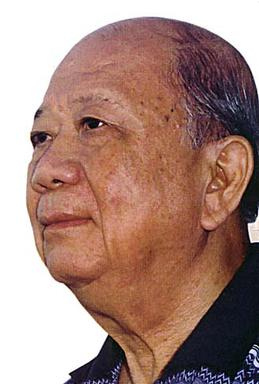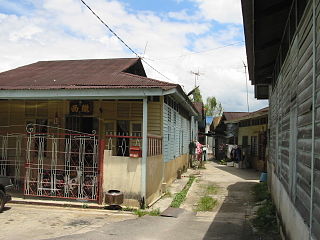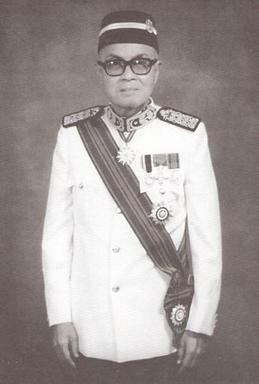
The Malayan Emergency, also known as the Anti–British National Liberation War(1948–1960), was a guerrilla war fought in British Malaya between communist pro-independence fighters of the Malayan National Liberation Army (MNLA) and the military forces of the Federation of Malaya, British Empire and Commonwealth. The communists fought to win independence for Malaya from the British Empire and to establish a socialist economy, while the Malayan Federation and Commonwealth forces fought to combat communism and protect British economic and colonial interests. The term "Emergency" was used by the British to characterise the conflict in order to avoid referring to it as a war, because London-based insurers would not pay out in instances of civil wars.

Chin Peng, born Ong Boon Hua, was a Malayan communist politician, anti-fascist activist and long-time leader of the Malayan Communist Party (MCP) or officially the Communist Party of Malaya (CPM) and the Malayan National Liberation Army (MNLA).

The Malayan Communist Party (MCP), officially the Communist Party of Malaya (CPM), was a Marxist–Leninist and anti-imperialist communist party which was active in British Malaya and later, the modern states of Malaysia and Singapore from 1930 to 1989. It was responsible for the creation of both the Malayan Peoples' Anti-Japanese Army and the Malayan National Liberation Army.

Operation Coldstore was the code name for a covert security operation executed in Singapore on 2 February 1963 which led to the arrest of 113 people, who were detained without trial pursuant to the Preservation of Public Service Security Ordinance (PSSO). In official accounts, the operation was a security operation "aimed at crippling the Communist open front organisation," which threatened Singapore's internal security. The operation was authorised by the Internal Security Council which was composed of representatives from the British government, Singaporean government, and the Malayan Federal government.
The Communist Party of Malaya/Marxist–Leninist was a splinter group of the Communist Party of Malaya. The CPM/ML was formed on 1 August 1974. It conducted armed struggle against the Malaysian government, with bases in southern Thailand. The CPM/ML had a radio broadcast, called Suara Seorang Malaysia.
Lai Teck was a leader of the Communist Party of Malaya and Malayan People's Anti-Japanese Army. A person of mixed Sino-Vietnamese descent, prior to his arrival in Malaya, Lai Teck was believed to have led his life as Truong Phuoc Dat until 1934, during which Dat disappeared and Lai Teck appeared.

The Briggs Plan was a military plan devised by British General Sir Harold Briggs shortly after his appointment in 1950 as Director of Operations during the Malayan Emergency (1948–1960). The plan aimed to defeat the Malayan National Liberation Army by cutting them off from their sources of support amongst the rural population. To achieve this a large programme of forced resettlement of Malayan peasantry was undertaken, under which about 500,000 people were forcibly transferred from their land and moved to concentration camps euphemistically referred to as "new villages".

New villages, also known as Chinese new villages, were internment camps created during the waning days of British rule in Malaysia. These camps were originally created as part of the Briggs Plan, first implemented in 1950 to isolate guerillas from their supporters within the rural civilian populations during the Malayan Emergency. Most were surrounded by barbed wire and watchtowers to stop people from escaping, with guards being ordered to kill anyone who attempted to leave outside of curfew hours.

The Malayan National Liberation Army (MNLA), often mistranslated as the Tentera Pembebasan Kebangsaan Malaya, was a communist guerrilla army that fought for Malayan independence from the British Empire during the Malayan Emergency (1948–1960) and later fought against the Malaysian government in the Communist insurgency in Malaysia (1968–1989). Their central committee was a trade union activist known as Chin Peng who had previously been awarded an OBE by the British for waging a guerrilla war against the Japanese occupation of Malaya. Many MNLA fighters were former members of the Malayan Peoples' Anti-Japanese Army (MPAJA) which had been previously trained and funded by the British to fight against Japan during the Second World War.

Too Chee Chew (杜志超 M.B.E., better known as C. C. Too, was a major exponent of psychological warfare in Malaysia.

The Communist insurgency in Malaysia, also known as the Second Malayan Emergency, was an armed conflict which occurred in Malaysia from 1968 to 1989, between the Malayan Communist Party (MCP) and Malaysian federal security forces.

The Baling Talks were held in northern Malaya on 28 and 29 December 1955 in an attempt to resolve the Malayan Emergency situation.
Eu Chooi Yip was a prominent member of the anti-colonial and Communist movements in Malaya and Singapore in the 1950s and 1960s. Eu Chooi Yip was born in Kuantan, Malaysia.
The Singapore Federation of Trade Unions was a trade union centre in Singapore. It was founded in October 1945 as the Singapore General Labour Union on the initiative of the Malayan Communist Party. SGLU was the first unit of the Malayan General Labour Union, which expanded throughout Malaya. SGLU was reconstituted as SFTU in August 1946, as the Malayan General Labour Union was divided into the SFTU and the Pan-Malayan Federation of Trade Unions.

The Malayan Peoples' Anti-Japanese Army (MPAJA) was a communist guerrilla army that resisted the Japanese occupation of Malaya from 1941 to 1945. Composed mainly of ethnic Chinese guerrilla fighters, the MPAJA was the largest anti-Japanese resistance group in Malaya. Founded during the Japanese invasion of Malaya, the MPAJA was conceived as a part of a combined effort by the Malayan Communist Party (MCP) and the British colonial government, alongside various smaller groups to resist the Japanese occupation. Although the MPAJA and the MCP were officially different organisations, many saw the MPAJA as a de facto armed wing of the MCP due to its leadership being staffed by mostly ethnic Chinese communists. Many of the ex-guerrillas of the MPAJA would later form the Malayan National Liberation Army (MNLA) and resist a return to pre-war the normality of British rule of Malaya during the Malayan Emergency (1948–1960).
Karl Anthony Hack is a British historian and academic, who specialises in the history of Southeast Asia, the British Empire, and of insurgency and counter-insurgency. Drawing on interviews with insurgents, his work has demonstrated the role of high-level coercion in winning post-war counter-insurgencies, and explored extreme violence and violence limitation. He has also carried out a wide range of public work, ranging across heritage, memory, the media and the courts. He is a professor of history at The Open University where he has also been head of history, and head of the School of History, Religious Studies, Sociology, Social Policy and Criminology. Prior to joining The Open University in 2006, he taught at the National Institute of Education, at Singapore's Nanyang Technological University, from 1995 to 2006.
Tan Sri Sir Claude Harry Fenner was the first Inspector-General of Police of Malaysia, serving from 18 September 1958 to 28 February 1966.
The Malaysian Communist Party (MCP) was a merger of the Communist Party of Malaya/Marxist-Leninist (CPM-ML) and the Communist Party of Malaya/Revolutionary Faction (CPM-RF). Both factions split out from the Malayan Communist Party in the 1970s. MCP traced its roots to splinter groups amongst communist guerrillas in southern Thailand in the 1970s. The party conducted armed struggle in the Malaysian-Thai border areas between 1983 and 1987. The former CPM-RF members lay down their arms on 13 March 1987 and the former CPM-ML members lay down theirs on 28 April 1987. It eventually accepted a deal for cessation of hostilities with the Thai military and its cadres were resettled in 5 'friendship villages'.
Anarchism in Malaysia arose from the revolutionary activities of Chinese immigrants in British Malaya, who were the first to construct an organized anarchist movement in the country - reaching its peak during the 1920s. After a campaign of repression by the British authorities, anarchism was supplanted by Bolshevism as the leading revolutionary current, until the resurgence of the anarchist movement during the 1980s, as part of the Malaysian punk scene.
Alias Chin Peng: My Side of History (2003) is the auto-biography of Malaysian communist leader Chin Peng, the former leader of the Malayan Communist Party who led the Malayan resistance against Japan during World War II, the resistance against the British occupation of Malaya during the Malayan Emergency, and later led communist forces during the Communist insurgency in Malaysia (1968–1989).













